Key Takeaway: Civil engineering tutoring provides personalized support for challenging topics, often boosting grades and confidence. Studies show many students improve by up to 3 grades within months of one-on-one tutoring.

Why Civil Engineering Tutoring Matters
As Alex stared at a structural engineering textbook late at night, he realized the problem set was beyond what he could solve alone. Civil engineering covers a wide scope of projects like roads, bridges, dams, and water systems, making coursework complex. Many high school and college students find core topics such as structural analysis or fluid mechanics challenging. In large classes, teachers often can’t tailor every lesson to each student’s pace. This is why one-on-one civil engineering tutoring matters: it provides personalized attention and support exactly where it’s needed.
Indeed, research confirms the impact of tutoring. Nearly 90% of studies report that tutored students achieve better exam results. For example, one study showed three in four students improved by up to three grade levels with consistent one-on-one tutoring. In fact, engineering exam prep programs have seen pass rates jump dramatically with tutoring – one civil engineering review course went from a 66% to a 90% pass rate among first-time takers when tutoring was added. These results highlight that civil engineering tutoring can significantly boost understanding, exam performance, and confidence.
To visualize just how effective personalized support can be, look at the data comparing student performance with and without tutoring support.
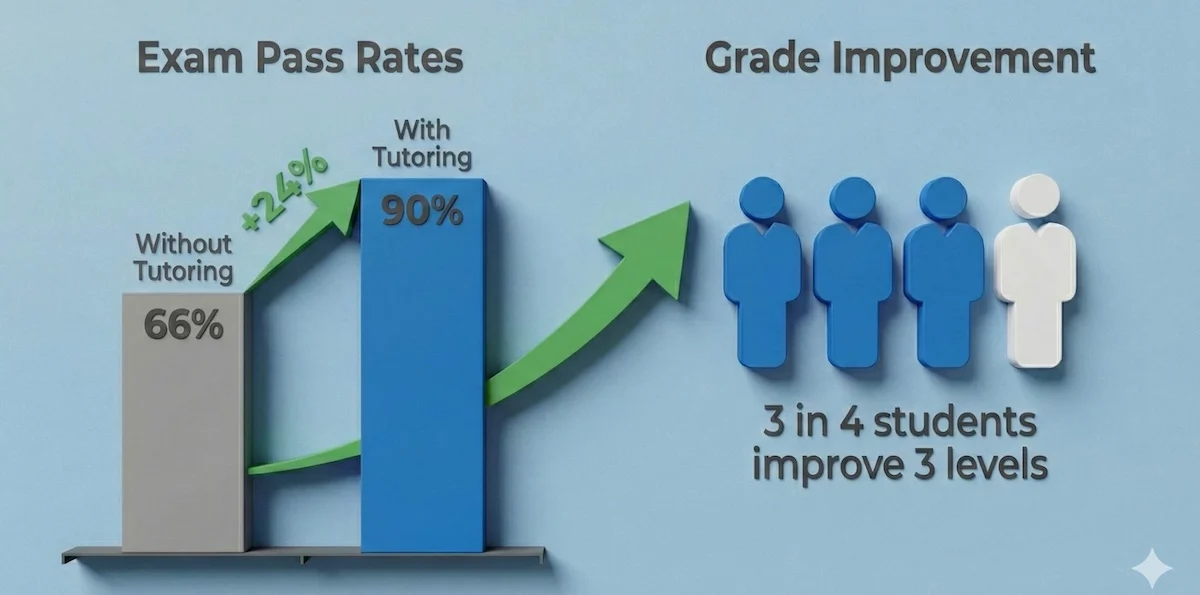
Research shows that personalized civil engineering tutoring significantly increases exam pass rates and grade levels.
As the data shows, the jump in pass rates highlights that individualized attention is often the missing variable in academic success.
Without extra help, many students struggle in this demanding field. About half of engineering majors change their field of study or drop out before graduation, often because they face obstacles in understanding complex coursework. A tutor can step in to prevent that outcome. With a skilled civil engineering tutor, students get step-by-step guidance through difficult topics, so assignments become manageable rather than overwhelming.
Core Civil Engineering Subjects Covered
Civil engineering tutoring can cover a wide array of subjects. Tutors often help students with courses like:
- Structural Engineering (strength of materials, design of beams, frames and bridges)
- Geotechnical Engineering (soil mechanics, foundation and retaining wall design)
- Fluid Mechanics & Hydraulics (water flow, pipe systems, open channel flow)
- Transportation Engineering (roadway and traffic design, transportation planning)
- Surveying & CAD (land surveying, AutoCAD, GIS mapping and modeling)
- Environmental & Water Resources (water treatment, flood control, wastewater design)
- Construction Management (project scheduling, cost estimating, construction planning)
Civil engineering is a vast field containing many interconnected disciplines. Use the map below to identify exactly which area you need support in.
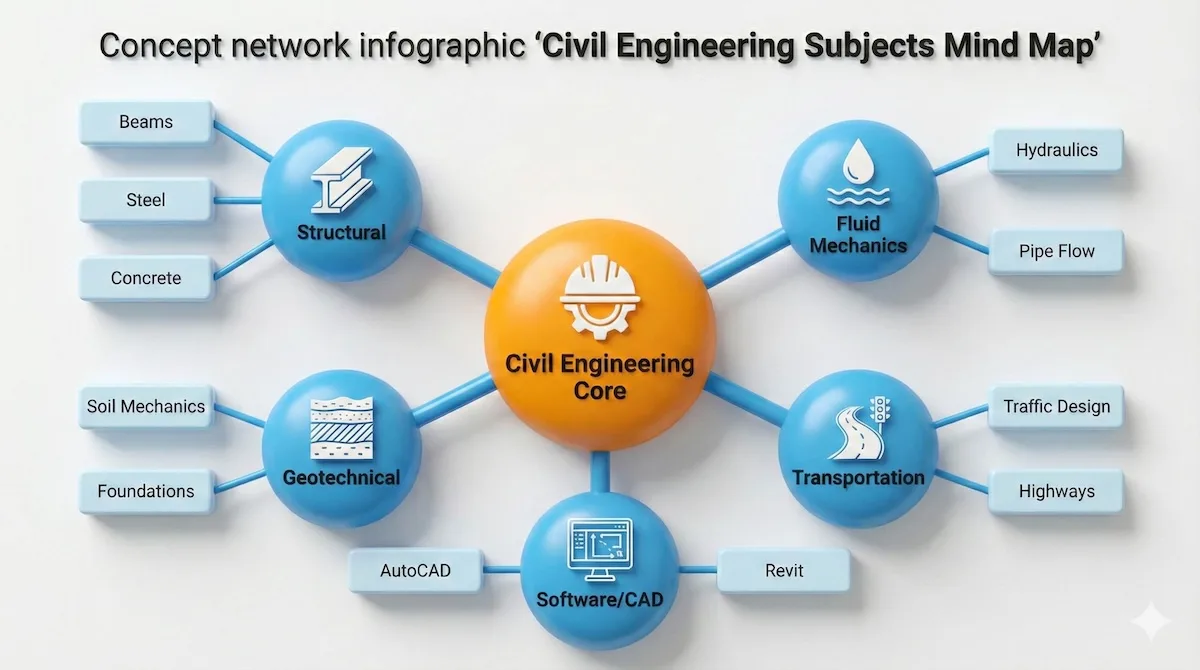
From structural analysis to fluid mechanics, professional tutors cover the full spectrum of civil engineering disciplines.
Whether you are struggling with the math in structural analysis or the design elements of transportation engineering, a specialized tutor can target these specific branches.
In addition, many civil engineering tutors also guide students through specialized topics and industry-standard software, such as:
- Advanced Concrete Technology
- Air Pollution Control
- Airport Engineering & Planning
- ArchiCAD
- Autodesk InfraWorks
- BIM 360
- Blast-Resistant Design
- Bluebeam Software
- Bridge Design Engineering
- Building Automation Systems
- Building Materials
- Building Service
- Civil3D
- Coastal Engineering
- Composite Materials & Structures
- Contract Law
- Dam Engineering
- Earthquake Engineering
- Energy Management
- Environmental Engineering
- EPANET
- ERDAS IMAGINE
- Estimation and Costing in Civil Engineering
- ETABS
- Feasibility Study
- Fire Fighting Safety & Protection Engineering
- Foundation Design & Engineering
- Fracture Mechanics
- Green Building Design
- Groundwater Engineering
- HEC-RAS
- Highway Design
- Hydrology
- InfoWater Pro (Autodesk)
- Irrigation Engineering
- Law Enforcement
- Manufacturing Science & Engineering
- Masonry Structures
- Microsoft Project
- Offshore Engineering
- Open Channel Flow
- PIPE-FLO
- PLAXIS 2D & 3D
- Primavera P6
- PTV Vissim
- Quantity Surveying
- Railway Engineering
- Real Estate Valuation
- Reinforced Cement Concrete (RCC)
- Renewable Energy
- Rock Mechanics
- SAP2000
- Slope Stability Analysis
- Soil Mechanics
- Solid Waste Management
- STAAD Pro
- Steel Structures
- Structural Analysis
- Structural Dynamics
- Structural Mechanics
- SUMO Traffic Simulator
- Sustainable Design & Development
- Tekla Structures
- Timber Structures
- Urban Transportation Planning
- Vectorworks
- Water and Wastewater Treatment
- Water Resources Engineering
- Water Supply Engineering
- WaterCAD & WaterGEMS
- Wind Engineering
Benefits of Tutoring and Homework Help
One-on-one tutoring offers clear benefits over large lectures. A tutor adapts the pace and examples to your needs, ensuring you fully grasp each concept. They can provide additional practice problems and walk you through textbook exercises. This extra guidance tends to translate into better grades and study skills.
While university lectures are essential for theory, they differ significantly from the targeted approach of private tutoring. Here is how the two learning environments compare.
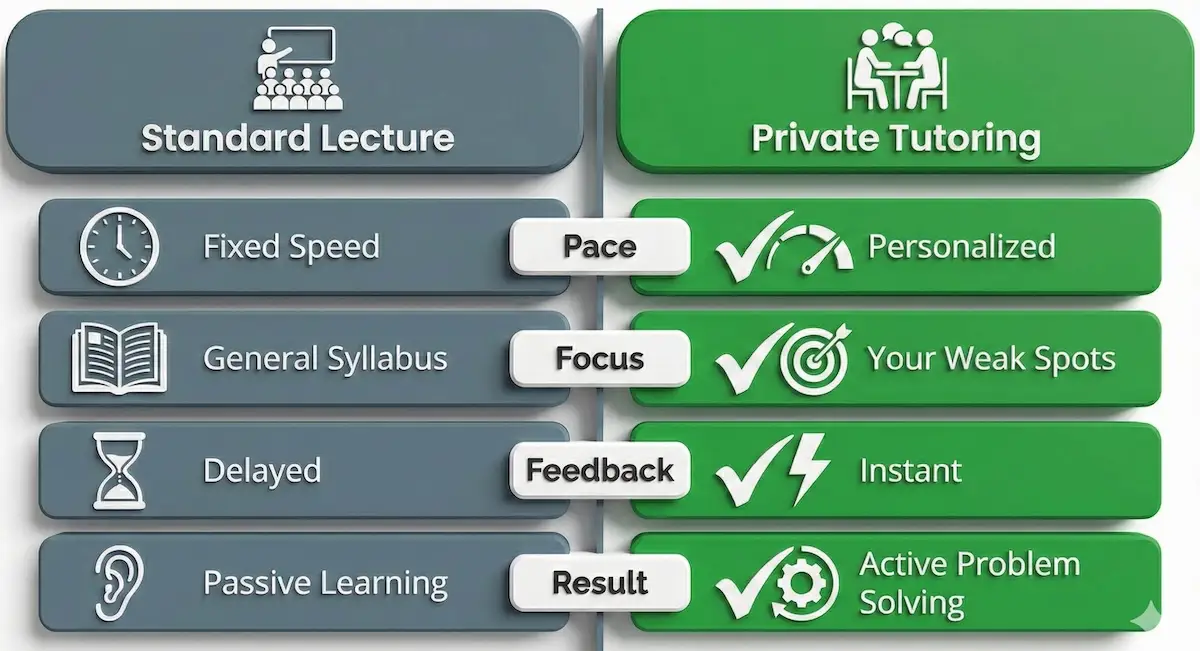
See the difference: how personalized tutoring fills the gaps left by standard university lectures.
The shift from passive listening in a lecture to active problem-solving with a tutor is what drives the rapid improvement in grades.
- Personalized Learning: Sessions are tailored to exactly what the student needs, filling gaps in understanding.
- Flexible Scheduling: Online tutoring is available at convenient times, fitting around the student’s busy life.
- Higher Grades: One-on-one tutoring often leads to higher test scores – research shows many tutored students achieve significant grade gains.
- Greater Confidence: With a tutor’s guidance on tough problems, students feel more prepared and engaged, which boosts their confidence.
- Direct Assignment Help: Tutors walk students through homework and assignment problems step-by-step, reinforcing learning rather than just giving answers.
Online Tutoring: Learn Anywhere
Online civil engineering tutoring has become increasingly popular and effective. Students from the US, UK, or Gulf can connect with expert tutors in different time zones without leaving home. Video calls and interactive whiteboards let tutors work through equations and CAD drawings in real time. In fact, recent education research notes that the shift to online tutoring (especially since COVID-19) has made engineering help more accessible than ever.
- Global Access: You can connect with expert tutors from anywhere, not just locally.
- Flexible Timing: Online sessions can fit after school or work hours, even on weekends, to match any schedule.
- Interactive Tools: Digital whiteboards, CAD screen-sharing, and video chat make online tutoring as engaging as in-person sessions.
You might wonder how technical subjects like CAD or fluid mechanics work remotely. Modern virtual classrooms are equipped with specific tools to bridge that gap.
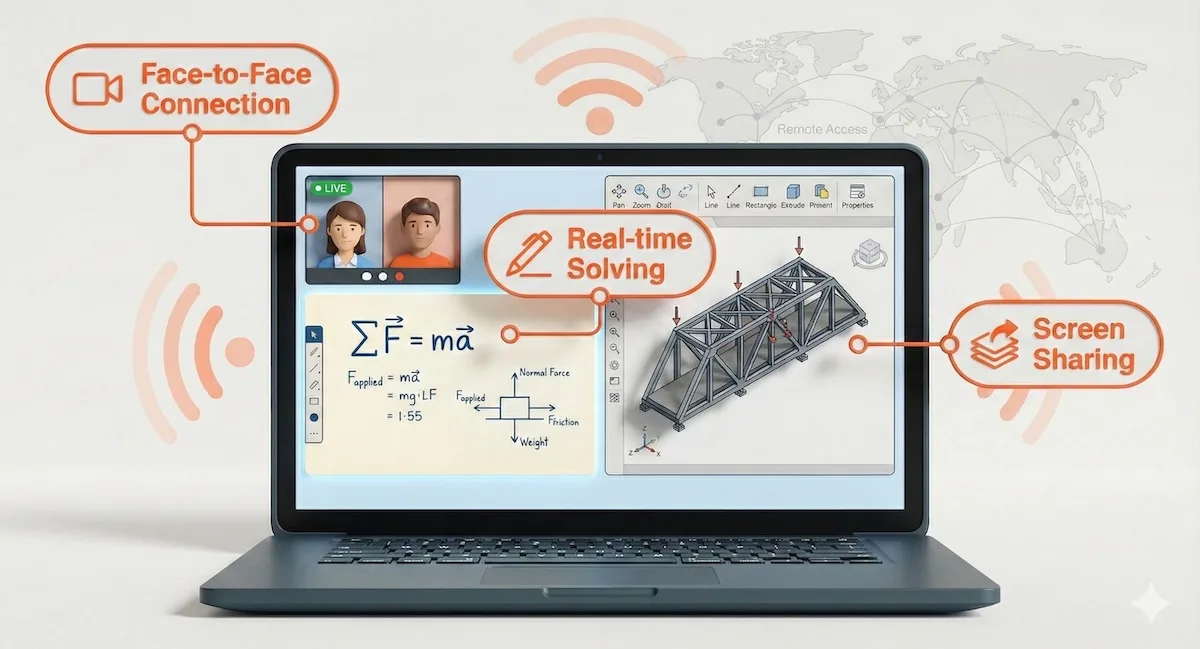
Modern online tutoring uses digital whiteboards and screen sharing to make solving complex engineering problems seamless.
With features like interactive whiteboards and screen sharing, online sessions often provide a clearer view of complex equations than a physical chalkboard.
How to Find and Hire a Civil Engineering Tutor
Finding the right tutor can be as important as the tutoring itself. Start by identifying the specific topics you need help with (such as calculus, dynamics, or surveying) and then search for a tutor with expertise in those areas. You can ask your school’s engineering department, look for peer tutors or honor societies, or use online tutoring platforms. When evaluating tutors, check their qualifications (a civil engineering degree or teaching experience is ideal), and read reviews or ask for a trial session. A short introductory lesson can show if the tutor’s teaching style works for you. Make sure the tutor’s schedule and rates fit your needs – many undergraduate tutors charge roughly $20–$30 per hour, while experienced professionals may charge more.
Finding the perfect match doesn’t have to be a guessing game. Follow this simple roadmap to ensure you hire a tutor who fits your specific academic needs.
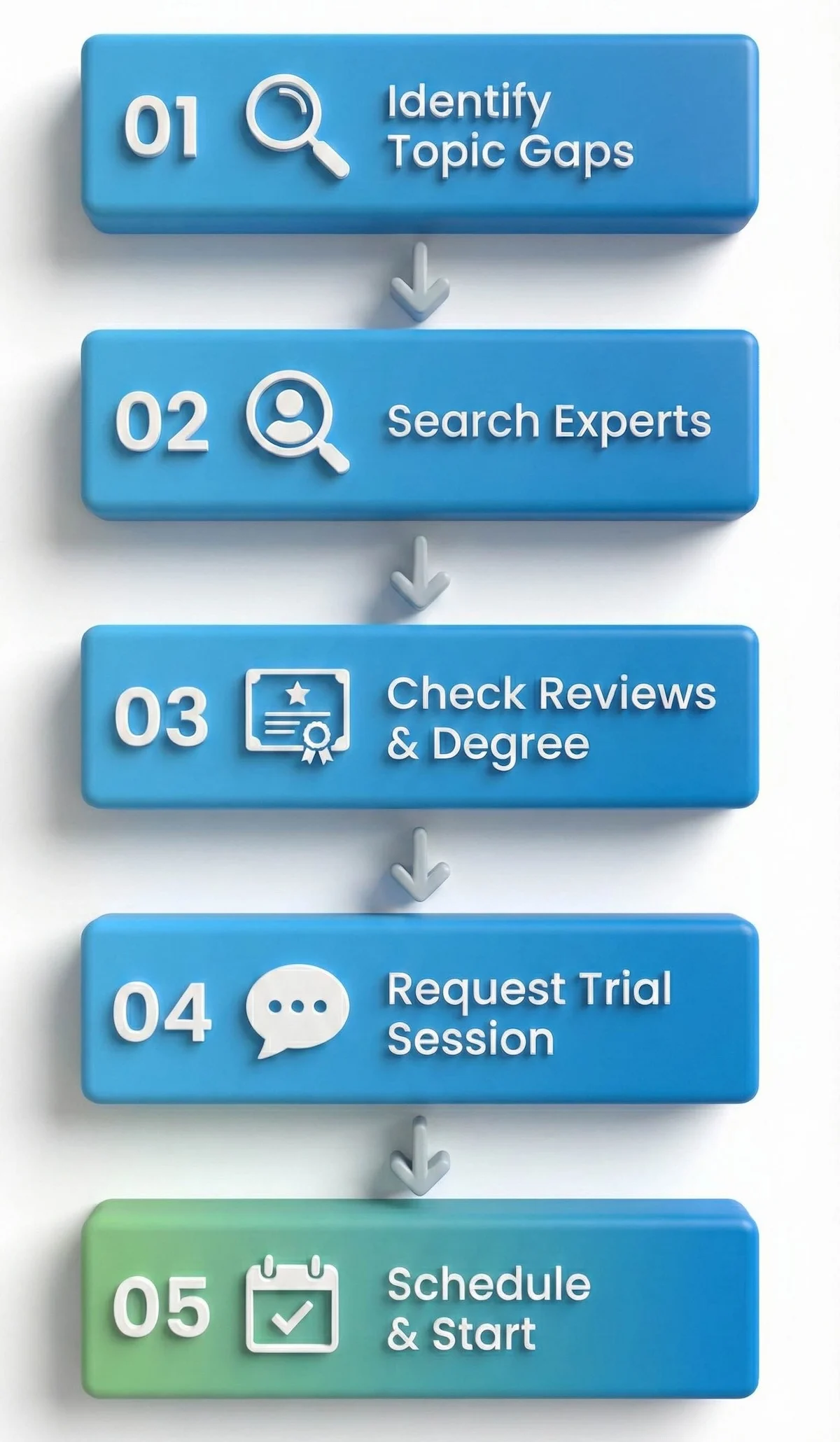
Follow this simple 5-step roadmap to find and hire the perfect civil engineering tutor for your needs.
Taking the time to verify qualifications and request a trial session ensures you get a subject matter expert, not just a general helper.
Conclusion
Civil engineering tutoring is about giving students the tools to succeed in a challenging field. Rather than falling behind, a student with tutoring support can tackle difficult subjects systematically. Studies show that tutoring helps students understand complex material and improve grades, and many learners do see their results rise by two or three grade levels. Whether you work with a tutor in person or online, the key is personalized feedback on assignments and practice problems. With the right tutor, even the toughest civil engineering courses become manageable – so consider seeking help early, before frustration builds, and watch your confidence grow.
Frequently Asked Questions
- Q: What is civil engineering tutoring? A: It’s personalized academic support from an expert who helps students understand civil engineering concepts.
- Q: How does online civil engineering tutoring work? A: Online tutoring connects you to a tutor via video and digital tools, giving one-on-one help on challenging topics from anywhere.
- Q: What’s the difference between a civil engineering tutor and a teacher? A: A teacher leads class instruction, while a tutor provides individualized help tailored to a student’s needs.
- Q: What do civil engineering homework and assignment help involve? A: They involve a tutor guiding you through coursework problems step-by-step so you learn how to solve them yourself.
- Q: When should I hire a civil engineering tutor? A: Consider hiring one if you’re struggling in class or want to boost your understanding and grades in civil engineering courses.
- Q: What is civil engineering hw help? A: It’s shorthand for homework help in civil engineering – a tutor assists you with your coursework and problem-solving.
******************************
This article provides general educational guidance only. It is NOT official exam policy, professional academic advice, or guaranteed results. Always verify information with your school, official exam boards (College Board, Cambridge, IB), or qualified professionals before making decisions. Read Full Policies & Disclaimer , Contact Us To Report An Error

